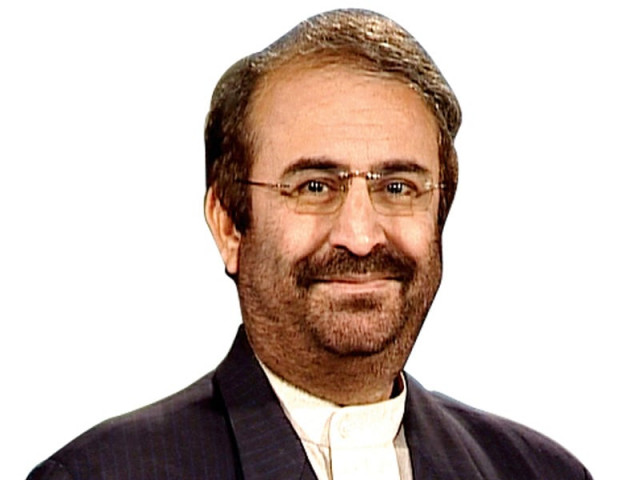All eyes on new High Peace Council chief
New appointment seen as part of Kabul’s efforts to revive peace process

New appointment seen as part of Kabul’s efforts to revive peace process.
The decision was finalised during a meeting of the National Security Council on Thursday, Pajhwok Afghan News agency reported while quoting an unnamed government source. President Ashraf Ghani presided over the meeting.
The High Peace Council has been without a head since January when its chief, Salahuddin Rabbani, was appointed as the country’s foreign minister. Although the council had been under fire for its ineffective role in peace talks since former president Hamid Karzai launched the forum five years ago, Qanooni’s appointment could be seen as a step to push the process forward.
The right man
Qanooni, who briefly served as the first vice-president, was also the speaker of the Wolesi Jirga (Lower House of Parliament), and minister of interior and education. He is a suitable choice as he has previously met with Taliban leaders at several unofficial meetings, and could play a substantial role in the negotiation process.
Taliban had included Qanooni in a list of seven senior Afghan leaders whom they had proposed for peace talks, confided a Taliban leader privy to the process. Qanooni also meet a senior member of the Taliban political office, Maulvi Shahabuddin Dilawar, when Afghan leaders attended a peace conference in France in 2012.
“Qanooni had been very pleased with the outcome of his meeting with Taliban leaders although it [the meeting] was not in a capacity as a government representative,” Nazar Mutmaeen, a political analyst and writer, said on Friday.
Mutmaeen, who regularly writes on Taliban and political issues, told The Express Tribune from Kabul that Qanooni “could play a positive role if he is given full powers” adding that “the US should not intervene in the peace process.”
Mutmaeen shared, “The council will have to decide if it wants to play role in the peace process or wants the Taliban to surrender. It could have an impactful role if impartial personalities are part of it and they have complete powers to take decisions independently.”
Challenging task
Qanooni’s biggest challenge will be to encourage the Taliban to join the intra-Afghan dialogue as they have deep suspicions about intentions of the two-headed National Unity Government in Kabul. Ghani and Chief Executive Dr Abdullah Abdullah will have to be on same page and come up with a strategy on how to revive the dialogue.
Ghani will have to reel in leaders still averse to the peaceful solution of the long-standing conflict. Senior government leader Ahmad Zia Massoud said this week “Negotiating with the Taliban is a waste of time.” Such remarks would be seen as unhelpful for the political process and would benefit those enjoying the status quo at the cost of the general public.
Joint effort
With the peace process at a deadlock, diplomatic efforts have been intensified to revive negotiations and several countries have thrown weight behind Pakistan’s initiative to achieve peace.
On Friday, China’s Special Envoy for Afghanistan Ambassador Deng Xijun met senior diplomats and military leaders, and lauded Pakistan’s efforts in facilitating reconciliation efforts in Afghanistan. “Ambassador Deng Xijun lauded Pakistan’s role in facilitating peace in Afghanistan and commended Pakistan’s concerted efforts and huge sacrifices in the fight against terrorism,” stated Pakistan Ministry of Foreign Affairs after Xijun met Prime Minister’s Special Assistant on Foreign Affairs Tariq Fatemi.
Last week, Iran’s top security adviser Ali Shamkhani also backed Pakistan’s role in the Afghan peace process just days after President Barack Obama also endorsed the efforts.
Meanwhile, unofficial efforts to aid the peace process are also gaining momentum. Members of parliament and civil society of both countries will meet in Islamabad next week to explore ways to help the process.
Pakistani and Afghan research centres will launch a major Pakistan-Afghanistan Track 1.5/II project titled ‘Beyond Boundaries’ as part of their efforts to help improve relations between the two neighbours, organisers said on Friday.
The Center for Research and Security Studies (CRSS) in partnership with its Afghan counterpart DURAN Research and Analysis will also be “facilitating and promoting people-to-people contacts,” author and CRSS head Imtiaz Gul told The Express Tribune.
Published in The Express Tribune, November 7th, 2015.



1724319076-0/Untitled-design-(5)1724319076-0-208x130.webp)















COMMENTS
Comments are moderated and generally will be posted if they are on-topic and not abusive.
For more information, please see our Comments FAQ